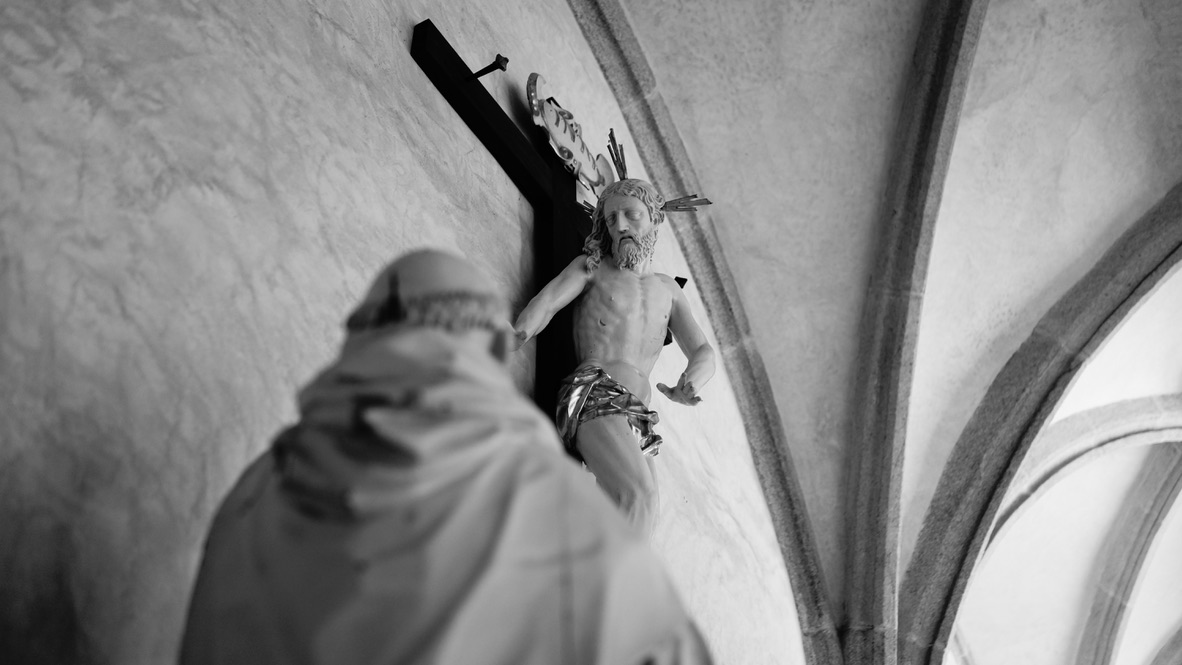Alone in penance and sorrow

CHAPTER XXV. Of Graver Faults
2 Mar. 2 July. 1 Nov.
Let that brother who is found guilty of a more grievous offence be excluded both from the table and from the Oratory, and let none of the brethren consort with him or speak to him. Let him be alone at the work enjoined him, and continue in penance and sorrow, remembering that dreadful sentence of the Apostle, “That such a one is delivered over to Satan for the destruction of the flesh, that his spirit may be saved in the day of the Lord.” Let him take his portion of food alone, in the measure and at the time that the Abbot shall think best for him. Let none of those who pass by bless him, nor the food that is given him.
With Holy Lent nearly upon us, Chapter XXV takes on a heightened significance. In a sense, we will, all of us, voluntarily take upon ourselves a certain identification with the brother found guilty of a more grievous offence. While there will not be exclusion from the table and from the Oratory, we will, during the days of Lent, be giving a more marked preference to silence and separation from the world. We will curtail, insofar as possible, parlours, correspondence, telephone calls, and the use of the electronic media for personal communications. During Lent there will be fewer recreations and more time given to lectio divina.
There is no one of us who does not need, as Saint Benedict says in this chapter, to be alone with Christ in the desert and to continue in penance and sorrow. Solus sit ad opus sibi iniunctum, persistens in paenitentiae luctu. “Let him be solitary at the work enjoined him, persevering in the sorrow of penitence.” The Benedictine observance of Lent, while challenging, is nonethless ordered to our restoration to spiritual health, as are all the penitential practices of the Holy Rule: ut spiritus salvus sit in die Domini, “that his spirit made be saved in the day of the Lord.”
Alluding to Psalm 128, Saint Benedict says that an excommunicated brother is not greeted with the customary blessing, Benedicite. “No passer-by will say, The Lord’s blessing on you; we bless you in the name of the Lord” (Psalm 128:8). The reference is also to what we read in the book of Ruth:
Et ecce, ipse veniebat de Bethlehem, dixitque messoribus: Dominus vobiscum. Qui responderunt ei: Benedicat tibi Dominus.
And behold, he came out of Bethlehem, and said to the reapers: The Lord be with you. And they answered him: The Lord bless thee. (Ruth 2:4)
When any one of us persists in some sin, or chooses to walk apart from the way of obedience to the Rule and to the abbot, that brother impedes the circulation of blessings and graces in the community. There can be no exchange of blessings, for to do so would be false. The hardening one’s heart to grace is no slight matter. It requires the suspension of the exchange of blessings until the hardened heart is touched by the grace of compunction and softened by the gift of tears.
No one should become anxious at the approach of Lent. There are brothers who work themselves into a state of anxiety, guilt, and foreboding over Lent. The Benedictine Lent is characterised by joy. It is not harsh, grim, and hemmed in by legalism. Mother Mectilde wrote something very sensible to a religious of the second monastery of Paris:
Do not torment yourself over penances. Divine Providence will provide you with them sufficiently. Be free, without attachments to anything, but always ready for what it will please the Lord to send you. Do not take things as coming from creatures, but as coming from God, in such a way that you abide in Him [even] in the unpleasant things that befall you. (Letter 359)
